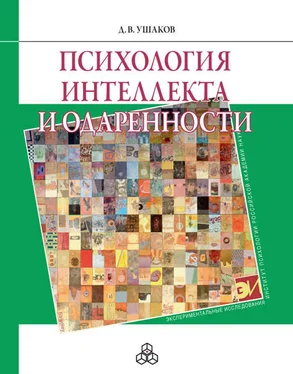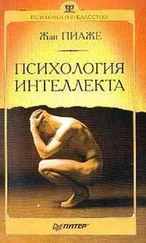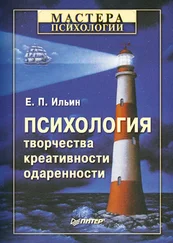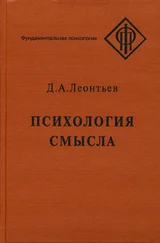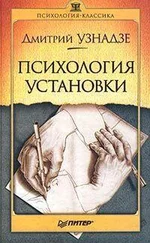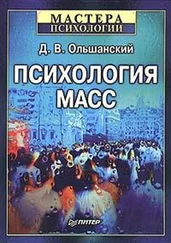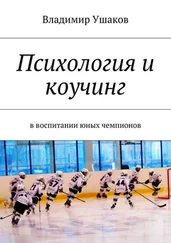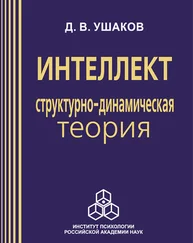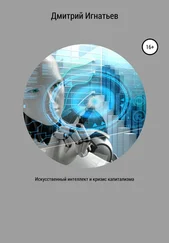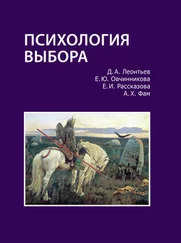Fulker D. W., DeFries J. C., Plomin R. Genetic influence on general mental ability increases between infancy and middle childhood // Nature. 1998. 336. P. 767–769.
Funke J. Computer-based testing and training with scenarios from complex problem-solving research: Advantages and disadvantages // International Journal for Selection and Assessment. 1998. 6. 2. P. 90–96.
Galton F. Hereditary genius. London: Macmillan, 1869.
Gagné F. Giftedness and talent: reexamining a reexamination of the definitions // Gifted Child Quarterly. 1985. 29. P. 103–112.
Gagné F. Toward a differentiated model of giftedness and talent // N. Colangelo, G. A. Davis (eds). Handbook of gifted education. Boston: Allyn & Bakon, 1991.
Galbraith R. C. Individual differences in intelligence: a reappraisal of the confluence model // Intelligence. 1983.7. P. 185–194.
Gardner H. Art, Mind and Brain: a Cognitive Approach to Creativity. N. Y.: Basic Books, 1982.
Gardner M. K. Frames of mind: The theory of multiple intelligences. London: Heinemann, 1983.
Gaultney J. F., Bjorklund D. F., Goldstein D. To be young, gifted and strategic: advantages for memory performance // Journal of experimental child psychology. 1996. 61. P. 43–66.
Gear G. Effects of training on teachers’ accuracy in the identification of gifted children // Gifted Children Quarterly. 1978. 22. P. 90–97.
Geary D. C., Brown S. C. Cognitive addition: strategy choice and speed of processing differences in gifted, normal and mathematically disabled children // Developmental psychology. 1991. 27. P. 398–406.
Gelade G. IQ, cultural values, and the technological achievement of the nation // Intelligence. 2008. 36 (6). P. 711–718.
Gerrig R. J. Text comprehension // R. J. Sternberg, E. E. Smith (eds). The psychology of human thought. Cambridge University Press, 1991. P. 242 –26 6.
Gesell A., Thompson H. Learning and growth in identical infant twins: an experimental study by the method of co-twin control // Genetic Psychology Monographs. 1929. 6. P. 1–124.
Glaser R. Some implications of previous work on learning and individual differences // R. M. Gagné (ed.). Learning and individual differences. Columbus: Merrill, 1967.
Gottfredson L. G. Why g matters: The complexity of everyday life // Intelligence. 1997. 24 (1). P. 79–132.
Gruszka A., Necka E. Priming and acceptance of close and remote associations by creative and less creative people // Creativity Research Journal. 2002. V. 14. №. 2. P. 193–205.
Gugliemino L. Self-directed learning readiness scale. Boca Raton, FL: Author, 1977.
Gunderson C., Maesch C., Rees J. The gifted-learning disabled student // Gifted Child Quarterly. 1987. 31. P. 158–160.
Halford G. S. Children’s understanding of the mind: An instance of a general principle? // Contemporary Psychology. 1996. 41. P. 229–230.
Hansford S., Whitemore J., Kraynack A., Wingenbach N. Intellectually gifted learning disabled students: A special study. Reston, VA: Council for Exceptional Children-ERIC Clearinghouse on Handicapped and Gifted Children, 1987.
Harnishfeger K. K., Bjorklund D. F. A developmental perspective on individual differences in inhibition // Learning and individual differences. 1994. 6. P. 331–355.
Hayes J. R. The Complete Problem Solver. Philadelphia: the Franklin Institute Press, 1981.
Henle M. On the relation between logic and thinking // Psychological Review. 1962. V. 69. P. 366–378.
Herrnstein R. J., Murray C. The bell curve: Intelligence and class structure in American life. N. Y.: Free Press, 1994.
Higgins E. T. Promotion and prevention experiences: Relating emotions to non-emotional motivational states // J. P. Forgas (ed.). The Handbook of Affect and Social Cognition. Mahwah, NJ: Erlbaum, 2001.
Hirschfeld L. A., Gelman S. A. (eds). Mapping the mind: Domain specificity in cognition and culture. NY, Cambridge University Press, 1994.
Hollinger C. L., Fleming E. S. A longitudinal examination of life choices of gifted and talented young women // Gifted Child Quarterly. 1992. 36. 4. P. 207–212.
Holyoak K. J., Nisbett R. E. Induction // R. J. Sternberg, E. E. Smith (eds). The psychology of human thought. Cambridge University Press, 1991. P. 50–91.
Hoofdakker B. van den, Nauta M., Veen-Mulders L. van der, Sytema S., Emmelkamp P., Minderaa R., Hoekstra P. Behavioral parent training as an adjunc t to routine ca re in c hildren w it h at tent ion-def icit/ hy peract iv it y disorder: Moderators of treatment response // Journal of Pediatric Psychology. 35 (3). 2009.
Horn J. M. Thinking about human abilities // J. R. Nesselroade, R. B. Cattell (eds). Handbook of multivariate psychology. N. Y.: Academic Press, 1988.
Horn J. M., Loehlin J. C., Willerman L. Intellectual resemblance among adoptive and biological relatives: the Texas adoption project // Behavior Genetics. 1979. 9. P. 177–207.
Howard-Jones P. A., Murray S. Ideational productivity, focus of attention, and context // Creativity Research Journal. 2003. V. 15. №№ 2 & 3. P. 153–166.
Howe M. J. A. The Origins of Exceptional Abilities. Blackwell, Oxford UK, Cambridge, USA, 1992.
Howe M. J. A. The childhoods and early lives of geniuses: combining psychological and biographical evidence // K. A. Ericsson (ed.). The road to excellence. New Jersey, 1996. P. 255–270.
Howley A., Howley C., Pendarvis E. Teaching gifted children: Principles and strategies. Boston: Little, Brown, 1986.
Hunt E. Mechanics of verbal ability // Psychological Review. 1978. 85. P. 10 9–1 3 0.
Hunt E. The role of intelligence in modern society // American Scientist. 1995. 83 (4). P. 356–368.
Hunt E. Nature vs. nurture: The feeling of vuja de // R. J. Sternberg, E. Grigorenko. Intelligence, heredity, and environment. Cambridge University Press, 1997. P. 531–551.
Hunt E., Wittman W. National intelligence and national prosperity // Intelligence. 2008. 36 (1). P. 1–9.
Hunter J. E. Cognitive ability, cognitive aptitudes, job knowledge, and job performance // Journal of Vocational Behavior. 1986. 29. P. 340–362.
Hunter J. E., Hunter R. F. Validity and utility of alternative predictors of job performance // Psychological Bulletin. 1984. 96. P. 72–98.
Hunter J. E., Schmidt F. L., Judiesch M. K. Individual differences in output variability as a function of job complexity // Journal of Applied Psychology. 1990. 75. P. 28–42.
Huteau M., Loarer E. Comment évaluer les méthodes d’éducabilité cognitive? // L’Orientation Scolaire et Professionelle. 1992. 21. P. 47–74.
Jacobs B. S., Moss H. A. Birth order and sex of sibling as determinants of mother and infant interaction // Child Development. 1976. 47. P. 315–322.
Jamison K. Touched with fire. Manic-depressive illness and the artistic temperament. N. Y.: Simon & Schuster, 1996.
Jensen A. R. Reaction time and psychometric g // H. J. Eysenck (ed.). A model for intelligence. Berlin: Springer Verlag, 1982. P. 93–132.
Jensen A. R. The puzzle of nongenetic variance // R. J. Sternberg, E. Grigorenko. Intelligence, heredity, and environment. Cambridge University Press, 1997. P. 42–88.
Jensen A. R. The g factor. Westport, CT: Praeger, 1998.
Johnson W., Bouchard T. J. The structure of intelligence: it is verbal. Perceptual, and mental rotation (VPR), not fluid and crystallized // Intelligence. 33. 2005. P. 393–416.
Читать дальше
Конец ознакомительного отрывка
Купить книгу
